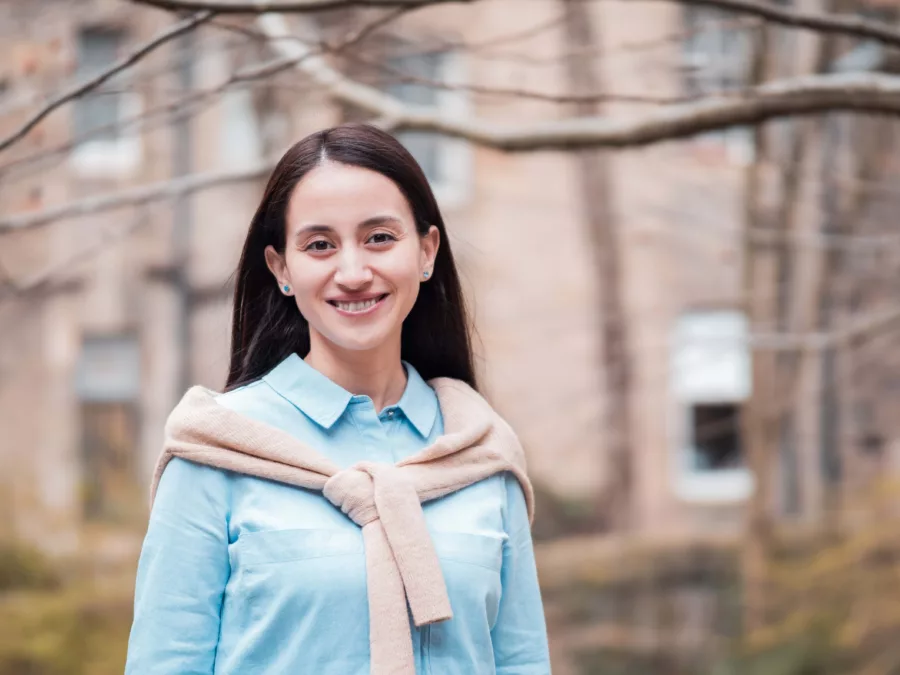Turkmenistan: engaging young people in climate action

Gulshat Ayydova, an educator and activist from Turkmenistan, is working to empower young people in her country to speak up about climate change and other environmental issues.
“We are doing our best to engage more young people around climate change issues and policies and ensure their voices are heard,” says Gulshat, a John Smith Fellow from our 2023/2024 Wider Europe and Caucasus fellowship programme.
Gulshat leads the environmental protection programmes at a newly established organisation called Ynamly Durmush, which means ‘You believe in a better life.’
She says: “Each year, I organise the Local Conference of Youth on Climate Change before the main COP climate conference. I also organise eco festivals, eco camps, trainings and workshops for a broader audience of young people who want to have fun and be introduced to environmental issues.”
The conference has grown over the last three years from a single event in the capital Ashgabat to events in six cities, attracting 600 young people. “They get inspired and start believing that many things are possible,” says Gulshat. “They start attending international forums and organising their own events in schools and universities.”
Power of education
A country that is 85% desert and rich in oil and gas, Turkmenistan faces specific climate challenges. “We have a limited source of water, which we share with our neighbours in Tajikistan, Uzbekistan and Afghanistan,” says Gulshat. “Water scarcity is a huge issue, especially in the north.”
Gulshat, who began her career as a teacher, knows from first-hand experience the power of education as a catalyst for change. “In 2015 I was studying English and German for my bachelor’s degree,” she explains. “My German teacher inspired me to start thinking about the pollution we create in our daily lives. In each lecture, she gave us some tips on how she reduces waste and how, in Germany, people are recycling and reducing their impact on the climate.
“I started doing all these things and it grew into my passion. Parallel with teaching, I organised some small projects. I organised my first eco camp here in Ashgabat for my students, then I travelled to the regions. Then I organised the conference. It got bigger and bigger, until I realised this is what I want to do professionally.”
Gulshat faces many challenges in dedicating her career to environmental protection. “This is a new field in my country,” she says. “There’s a lack of jobs, a lack of opportunities and a lack of funding.” The decision by the US government to freeze USAID has directly affected Gulshat’s organisation, meaning she will have to find alternative sources of funding for her programmes.
Inspiring fellowship
Gulshat’s action plan for her John Smith Trust fellowship is to develop a strategy for engaging young people on climate issues and building a movement which engages and empowers them to improve climate resilience in her country.
During the residential part of her fellowship in the UK, Gulshat visited several environmental education and youth organisations, including Learning for Sustainability Scotland. “They shared some very good resources with me for gaining knowledge, skills and funding,” she says.
“In London, I visited the Green Schools Project, which integrates environmental sustainability into schools, and My Life My Say, a very energetic youth-led organisation. They run policy cafes where they engage young people in discussing issues that affect their lives. That was very inspiring for me. I like the idea of organising informal meetings to engage young people in the policy negotiations.”
Raising ambition
For Gulshat, the highlight of the programme was the leadership training. She says: “The techniques they gave us, such as active listening skills, giving feedback and different leadership styles, are not only useful in my work but also in my family, which is fabulous!
“When I applied to the programme, my idea was to continue with the eco clubs I was already running. But then I got inspired and I understood that I could do more. I could meet with NGOs and ask them my questions and my dream would be closer. So I rewrote my action plan to register my own NGO.
“It’s a life-changing programme because you start believing in yourself more. It raised my ambitions, gave me confidence in what I’m doing and helped me believe I’m on the right path.”
Although bureaucratic barriers meant Gulshat couldn’t start her own organisation at this time, she saw an opportunity to achieve her goals with Ynamly Durmush. “It’s an economic society that functions like an NGO,” she explains. “It works on topics like human rights and gender equality. I’m leading on the topic of environmental protection.”
Climate academy
Gulshat’s plan for this year is to create an academy to prepare young people to represent Turkmenistan at the COP climate conference and speak to government officials about their climate demands.
“I want to prepare at least 20 young people to attend COP30 in Brazil and I want to attend it myself,” she says. “That’s my main goal for this year. And in future years I want to strengthen the network I’m building through values and various events. I want to be at the table where decision-making is happening. I want my voice and opinion to be included in the dialogue.”
